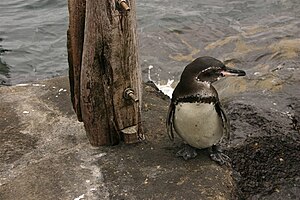Headlines:Galápagos Penguins Face Microplastic Crisis, Urgent Action Needed
January 24, 2024

A recent study published in PLoS ONE reveals alarming levels of microplastic pollution threatening the Galápagos penguin ecosystem. Titled "Understanding Microplastic Impact on Galápagos Penguins," the research warns of a serious risk to the unique wildlife of the Galápagos Islands.
Researchers used advanced models to study how microplastics accumulate and magnify in the Galápagos penguin food web. The key findings highlight the urgent need for action:
1. Widespread Accumulation: Microplastics were found in all parts of the food web, accumulating as they move through the ecosystem. The extent of harm depends on the type of plastic.
2. Penguin Vulnerability: Galápagos penguins are the most affected, with the highest levels of microplastics per unit of their body mass. Other species like barracuda and anchovy are also at risk.
3. Biomagnification Confirmed: Microplastics magnify as they move up the food chain, posing a significant threat to the entire ecosystem.
4. Model-Empirical Differences: While the study matched real-world data for some species, it underestimated microplastic levels in penguin droppings.
Researchers concluded that urgent steps are needed to address this threat to Galápagos penguins and other endangered species. They called for more research to understand how different plastics affect marine life.
In response to these findings, the researchers recommended immediate action, including the implementation of policies to reduce plastic pollution in the Galápagos Marine Reserve. This study is a wake-up call for protecting the delicate ecosystems of the Galápagos Islands from the growing menace of microplastics.
See also
- Library: Modelling microplastic bioaccumulation and biomagnification potential in the Galápagos penguin ecosystem using Ecopath and Ecosim (EwE) with Ecotracer (research)
- Penguin Portal
- Penguin news
- Penguin videos
- Penguin research
- Penguins - Animal Hub
- Penguins - Newshound
Sources
Notes
| This page is part of the Animal News portal. Pictures may be representative of the news article. The opinions expressed by writers are their own. |
